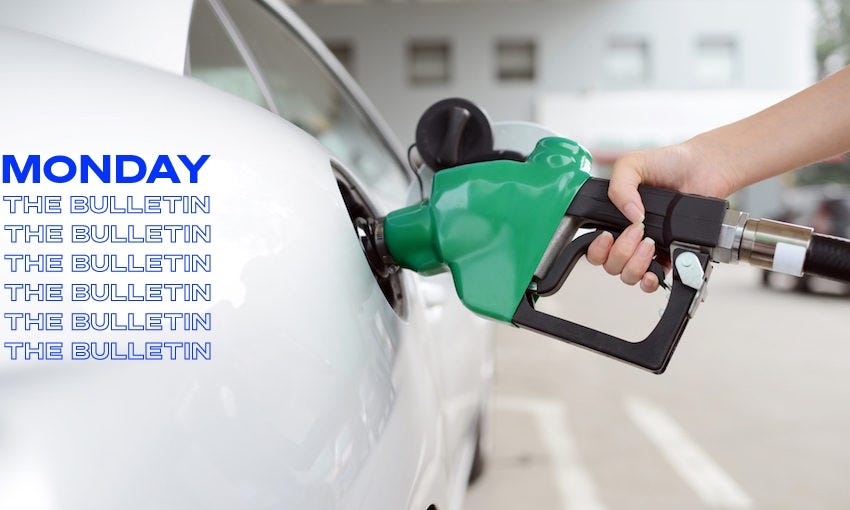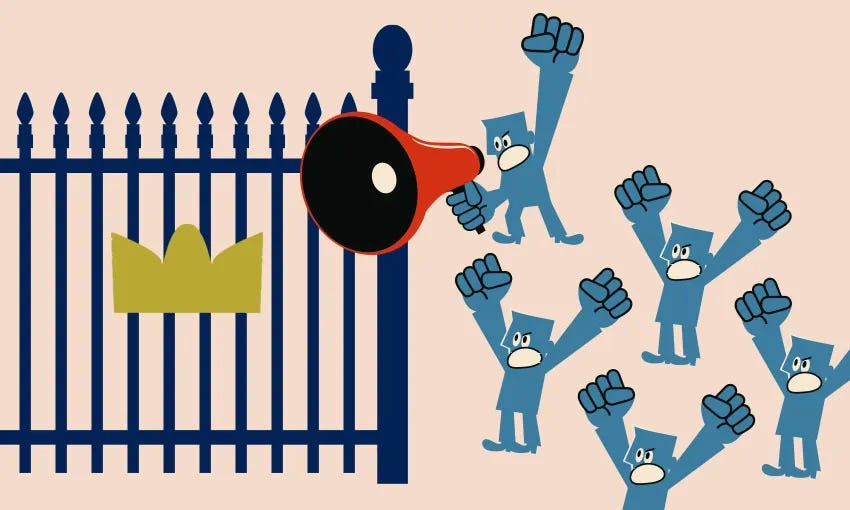The cost of living crisis
The soaring price of petrol is only the latest of many economic troubles coming at us this year
Mōrena and welcome to The Bulletin for Monday, March 14, by Justin Giovannetti. Presented in partnership with Z Energy.
In today’s edition: Covid’s death surge; Mahuta admits errors on three waters; Greenpeace flotilla drops anchor; but first, the cost of living is increasing fast.
The Automobile Association is warning $4 a litre for petrol is possible. (Getty Images)
After two years of delayed shipping and growing inflation, the worst is yet to come.
The global economy is heading into a hurricane as a series of profound shocks, from the highest inflation in a generation to supply lines disrupted by Covid-19, have worsened with the Russian attack on Ukraine. In only a few weeks most of the Russian economy has been walled off from the rest of the world by sanctions. Oil prices have responded, increasing by half since Christmas, while global commodities are undergoing their greatest shock since the 1970s. As Stuff reports, wheat is now facing its worst disruption since the first world war. Most of the economic chaos seen in stock tickers over recent days hasn’t made it yet to the world’s streets, but unaffordable fuel prices and hungry people don’t make for political stability.
Few scenes are more closely linked to economic disturbance than long queues at petrol stations.
Motorists began forming queues throughout New Zealand on Friday amid a warning from Waitomo that it would need to increase petrol prices significantly that day. After it sold a lot of fuel, the company told RNZ that the warning wasn’t a marketing stunt. While there were some reports that prices remained largely stable, the company said it added 20 cents to the average litre of petrol. The high price of fuel, which is above $3 per litre across much of Aotearoa, isn’t likely to go down soon. Bans on Russian oil have sent prices to well over $100 US per barrel and some shortages are possible before the global market stabilises. The AA has warned drivers to ready themselves for $4 a litre.
Parliament now faces calls to act as many families won’t be able to balance their budgets.
Parliament spent much of last week debating whether to apply the crisis label to the increasing cost of living. It wasn’t a particularly insightful debate and did nothing for families who are struggling. RNZ’s Jane Patterson has looked at National’s idea for a tax cut to help. Economists are split on whether it would do more good than harm, but the government isn’t interested. Labour has so far dismissed price increases as a problem caused by overseas events. Which is true, but that’s unlikely to be a comfort for the public. The NZ Herald reports on Act’s proposal to turn over the proceeds from the sale of carbon credits to taxpayers. The nearly $4.4 billion fund is meant to pay for the country’s climate change programme. A number of governments have unveiled fuel rebates over the past week. Australia’s treasurer is now being urged to do the same, according to ABC.
Petrol is only part of the problem. The UN is warning that food prices could increase by 20% this year, according to Reuters. Russia and Ukraine were some of the world’s largest wheat producers.
A crisis on top of a crisis on top of a crisis.
I suspect that for many readers this morning’s newsletter won’t be a comforting one. The country is exhausted by Covid-19 and hundreds of thousands of New Zealanders are currently dealing with the pandemic in a way that is both deeply personal and unprecedented in this country. A cost-of-living crisis, along with a large ground war in Europe, is a lot to deal with on top of that. Unfortunately, this is also the kind of economic crisis that will likely distract from pressure to move on climate change. As Kevin Norquay writes in the Sunday Star-Times, this is the “big stretch” where we all need to cope. Pace yourselves and make plans to stretch your budgets over the coming year. It’s time to be prepared and the best way for me to do that is to stay informed of what’s coming next.
A note from Toby Manhire, editor at large
On Wednesday March 2, the 23-day occupation of parliament came to an end amid terrible and unprecedented scenes on the doorstep of New Zealand’s house of representatives. It was a lot to keep up with – and a lot to get our collective heads around. At the Spinoff we were able to call on Justin Giovannetti, our political editor, to report from the press gallery, while Stewart Sowman Lund travelled to Wellington to run our news updates on location.
More than any protest action in New Zealand history, it needed to be understood not just on the ground, but in the digital undergrowth. Dylan Reeve dived into a teachable moment; I surveyed the key figureheads; Madeleine Chapman raised the alarm on a puff piece. Annabelle Lee-Mather, Justin and I discussed it all on the latest edition of the Gone By Lunchtime podcast (listen here).
The story is far from over, and we’ll continue to pull on the threads: from the global context and conspiracy theories to misinformation, disinformation and social media’s role; from the arguments around mandates to social cohesion.
As we continue to struggle against commercial headwinds, contributions from our members are more critical than ever – we simply couldn’t do this work without their support. If you value what we do, please consider becoming a member today. Donate now.
Covid’s death toll is rising as omicron’s wave could be peaking in Auckland.
Hospitalisations and deaths are lagging indicators of Covid, only following days or weeks after cases move through an area. Epidemic modeller Michael Plank told RNZ that there’s ample proof omicron is now in retreat in Auckland. However, hospitalisations and deaths could still increase for some time. Michael Baker told Stuff that the death toll could top 20 daily due to the massive size of the omicron surge. While that sounds low, the country only had 51 total deaths from Covid at the start of the year.
The Spinoff’s Covid data tracker has the latest figures.
Nanaia Mahuta says she got two things wrong with three waters.
The local government minister told Q+A that she “underestimated” two key areas of her big infrastructure plan. She didn’t understand how little the public knows about what happens with the country’s water systems and an ad campaign for three waters that angered councils may have been insensitive. Although Mahuta didn’t walk back the criticism of the ads, which is that councils haven’t invested enough in infrastructure over decades. With some commentary that she might not retain the local government role, Mahuta said she was the right person for the job. She’s also the foreign affairs minister at a time of high global tensions.
Greenpeace ‘peace flotilla’ anchors by Russian oligarch’s retreat.
At least seven boats are now at Helena bay in Northland to protest the Russian invasion of Ukraine. After parliament passed a sanctions bill last week, the protesters want the government to freeze all assets belonging to Russian oligarch Alexander Abramov, including the luxury resort they are anchored at. As Stuff reports, the Russian’s resort is one of the more conspicuous signs of Russian wealth in Aotearoa. Also on Q+A, Mahuta wouldn’t comment on which people would face sanctions.
Prime minister to meet with Groundswell leaders.
After twice declining to meet with the rural group, described by one cabinet minister as “a mixture of racism, anti-vax”, Jacinda Ardern’s office confirmed that she’ll meet with Groundswell. Organisers told Stuff they thought the invitation from the PM was a reward for not turning up at the Wellington occupation. Certainly in comparison, Groundswell came off as a reasonable venue for dealing with rural grievances from across the motu. No date has been set for the meeting.
At least 35 dead as Russia strikes base in far western Ukraine.
Russian cruise missiles have pounded a Ukrainian training base near that country’s border with Poland, a Nato member. As the AP reports, the base is a crucial hub for cooperation between Ukraine and Nato countries. Instructors from the US, Canada and other Nato members had used the base to train Ukrainian soldiers. Nato has said it doesn’t have any troops in Ukraine now, but has reinforced defences in nearby countries. The 30 member military alliance has warned Russia that an attack on any of its members, even accidentally, would be met by retaliation. Russia is now pushing right up to that line.
Got some feedback about The Bulletin, or anything in the news? Get in touch with me at thebulletin@thespinoff.co.nz
Dylan Reeve looks at why a small but persistent group of protesters gathers at Government House daily. Duncan Greive writes about the Alternative Commentary Collective, which changed Aotearoa’s media. Tame Malcolm asks if poisoning pests is the Māori way. Alex Casey reminisces about that time Mike Hosking met with celebrities. Danyl Mclauchlan, in the Sunday Essay, explains that the best way to look at New Zealand isn’t left v right.
Crusaders no longer undefeated after loss to Chiefs in Christchurch.
The Super Rugby Pacific favourite has shown it can be beaten, and at home. As Stuff writes, Australian teams are now sitting back and watching New Zealand franchises cannibalise one another. There were some key players missing on the Crusaders bench. With omicron cases now detected in most of the country’s top rugby teams, it’ll be a difficult few weeks for the sport.













